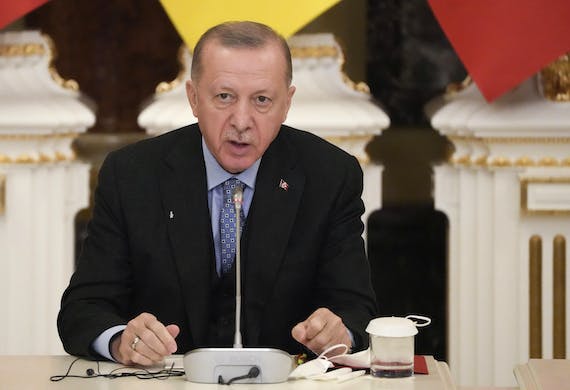Signs of Thawing Seen in Turkish-Israeli Relations
A news article highlights Ankara’s rapprochement toward Israel and a public rebuke of Iran.

The latest indication that Ankara is warming up to Jerusalem arrived Friday via a scoop in the Turkish newspaper Sabah, which detailed an extraordinary Turkish-Israeli intelligence operation to prevent an Iranian assassination of an Israeli businessman.
Does the recent Ankara-Jerusalem thaw represent a true springtime in relations between erstwhile best friends, or is it a short-lived Indian summer?
Sabah, which was once owned by President Erdogan’s son-in-law and is considered a regime mouthpiece, reported on the attempt by nine Iranian “hit men” to assassinate Yair Geller, who was described as an “Istanbul-based tycoon with investments in the machine and defense industries.”
On the advice of Turkey’s National Intelligence Organization and Israel’s Mossad, Mr. Geller, president of Turkey-based CNC Advance Technologies, moved out of his Istanbul residence and to a safehouse. The Iranian operatives nevertheless kept surveillance on his home and business.
A dual Turkish-Israeli citizen, Mr. Geller even “turned down Tel Aviv’s offer to resettle him to Israel for his safety, saying he would not leave Istanbul, a city he loves,” according to Sabah.
The article highlights two aspects of a major rethinking in Ankara — or, more precisely, by Mr. Erdogan. One is Ankara’s rapprochement toward Israel, a country the Turkish strongman has long lashed at and pushed as a target of violence. The other is a public rebuke of Iran, a Turkish “frenemy” that at times it is a partner in crime and at others is a competitor for leadership in the Muslim world.
Mr. Erdogan last week invited President Herzog of Israel for a visit in March. Although details are yet to be finalized, it will be the first of its kind since 2007. Turkish-Israeli relations hit their lowest point a decade ago, when commandos raided a Turkish flotilla that provocatively entered Israel’s territorial waters in an attempt to deliver aid to Hamas-controlled Gaza.
Following that deadly incident aboard the Mavi Marmara ship, Mr. Erdogan’s rhetoric on Israel sharpened. Turkish television broadcast anti-Semitic series, and the Erdogan-friendly media filled with anti-Israel invective.
The second most powerful Hamas operator, Salah Arouri, moved his base to Istanbul and in 2020 President Trump’s State Department condemned Mr. Erdogan for hosting a Hamas delegation, including the terrorist organization’s chief, Ismail Haniyeh.
Israelis, who had once favored Turkey as a beloved vacation spot, stopped visiting the country following several runs-in with authorities.
It is possible that Ankara’s latest turnaround came in part after realizing that an Iranian kidnapping in Istanbul could further erode its entire tourism industry, a major source of income.
It could also be, as some Turkish sources tell me, that Mr. Erdogan believes in the influence of Israel in American foreign policy. He may have come to the conclusion that to repair Turkey’s image in Washington, Ankara needs to amend relations with Jerusalem — and perhaps even go so far as to sever ties with Iran.
Turkey has long profited from oil smuggling on the Iranian border and other violations of American and international sanctions against Iran. Yet Mr. Erdogan’s claimed leadership of Sunni Islam has clashed with Shiite Iran’s campaign to dominate the Mideast.
Most crucially, the Turkish economy is in the tank. Inflation sits at more than 36 percent, the national debt has ballooned by nearly 10 percent in the last year, and 40 percent of Turkey’s energy comes from Russia, with the rest from Azerbaijan and America.
When the State Department recently denigrated Eastmed, an Israeli-Cypriot-Greek project to pipe gas to Greece from the eastern Mediterranean and from there to Europe, Mr. Erdogan welcomed the decision. Turkey, he announced, is a more economically realistic conduit than its traditional rival, Greece, for transferring Israeli gas to Europe.
The sagging Turkish economy, widely believed to be further hindered by Mr. Erdogan’s insistence on keeping interest rates at near zero, is thus likely the top reason for his decision to mend relations with Israel.
The alleged Iranian attempt to kill an Israeli businessman — said to be planned as retaliation for the Israeli assassination of the “father” of Iran’s nuclear program, Moshen Fakhrizadeh — also provides a good backdrop for the turnaround. Mr. Herzog’s upcoming visit could complete Mr. Erdogan’s about-face.
Israel’s first prime minister, David Ben Gurion, believed in an alliance with the region’s non-Arabs — Persians, Turks, the Kurds, and others. After the 1979 revolution, Iran became Israel’s most bitter enemy. Mr. Erdogan’s Turkey later followed suit, breaking its deep ties with the Jewish state.
Now, Ankara craves a renewed alliance, even as it warms up chilly relations with other former regional allies — Egypt, Saudi Arabia, the United Arab Emirates. Will it last? Mr. Erdogan’s mercurial decision-making process is legendary, and he can turn on a dime.
“I’m cautiously optimistic,” says a longtime Erdogan critic, Aykan Erdemir, a former member of Turkey’s National Assembly who is currently with the Foundation for Defense of Democracies in Washington. Of course, he says, Mr. Erdogan “can change course again. He’s capable of making multiple U-turns.”
Twitter @bennyavni

